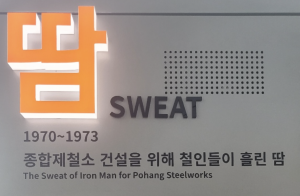Pohang: POSCO Museum
Photo essay of wall text of POSCO Museum of Pohang

Photo essay of wall text of POSCO Museum of Pohang

XXX

1) Haitian government instability: Despite some knowledge of the Dominican Republic, I hadn't fully grasped the political instability in Haiti. This is an important factor when looking at disaster relief as political climate can often dictate how well or poorly aid is received.
2) USAID: I've chosen to delve into more about the USAID, including what countries are currently being given aid and how, including Haiti.
3) UN Peacekeeping units: obviously, a force meant to be helpful and to bring the world a little closer. Yet, the article seems to indicate peacekeeping forces can do more harm than good; I'm curious to see if this is a common theme, and if so, why this continues to occur.
While there was criticism of the policy (see the Washington Post's rebuttal), the policy appeared to be well received until implementation of quarantine for returning health care workers. This, and the backlash, caused the policy to be revised and invited confusion about guidelines. Leaders may have lost political points by staying firm with their guidelines, but chose to revoke their initial decisions-- leading to confusion and worry in the general population.
Paul Farmer is the chair of the Department of GLobal Health and Social Medicine at Harvard Medical School. He is an expert in health care services and advocacy for those who are sick and in poverty. He doesn't appear to be situated in emergency response; he seems to be much more on the follow-up months or years later. Dr. Farmer has myriad publications of relevance to the Network, and his research foci are mostly regarding establishing high-quality health care in resource-poor environments. (http://ghsm.hms.harvard.edu/person/faculty/paul-farmer)
Bruce Nizeye works as the Chief of Infrastructure for PIH in Rwanda. It appears that his expertise is in physical constructs. I could not find how he was situated in emergency response, but it appears that he takes a role on the back side of disasters, much like Dr. Farmer. (http://www.pih.org/blog/the-voices-of-our-colleagues/)
Sara Stulac is an Associate Physician in the Division of Global Health Equity at BWH. She is also the Deputy Chief Medical Director for PIH. She seems to be an expert in pediatrics, specifically HIV care and prevention and oncology. Like her other authors mentioned on this page, she does not seem to be directly involved with emergency response. Her research foci are mostly not related to emergency response, but dealing with non-emergent pediatric care. (http://www.brighamandwomens.org/Departments_and_Services/medicine/servi…)
Salmaan Keshavjee is a professor at HMS and a physician at BWH. He has conducted research on post-Soviet Tajikistan's health transition and worked on an MDR-TB treatment program in Tomsk, Russia. Rather than emergency response, Dr. Keshavjee seems to be focused on epidemiology like his co-authors. He has a number of research foci including MDR-TB treatment and policy, health-sector reform in transnational societies, the role of NGOs in the formation of trans-border civil society, and "modernity, social institutions, civil society, and health in the Middle East and Central Asia. (http://ghsm.hms.harvard.edu/person/faculty/salmaan-keshavjee)
Preston's article mentions the EPA still had not formulated and enacted a plan for cleanup-- it should be noted the year of publication was 2006. She claims "After an expert panel failed last year to settle on a method for organizing an E.P.A. cleanup, the agency said it would proceed anyway with limited testing and cleaning". Moreover, in the 10 years since publication, several studies have indicated increased public health risks and chronic illness prevalence in populations near the disaster zone. It seems the approach of sit-and-wait did nothing but exacerbate the issue, leading me to believe this will serve as a symbol in any future pollutant-laden disasters.
Users enter summaries of articles onto the website as well as replies on articles. Users also enter anti-spam information, email addresses, their names, and websites they may be associated with.
At this point, no. The program seeks to remedy failings within the prison health care system. Health care professionals who provide treatment and services are licensed physicians, nurses, residents, or current medical students.
MSF is focused on providing aid where aid is needed, thus the name "Doctors without Borders." They don't care what the policital or socioeconomic status is in a region, they'll provide aid no matter what. They're also able to provide their own funding rather than relying upon that of local governments.